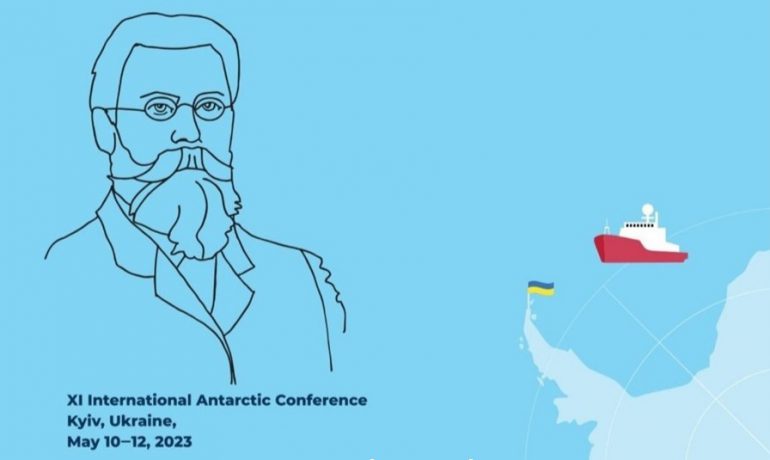The results of leading Antarctic research and the impact of full-scale Russian aggression on Ukrainian science, including the development of the Antarctic community as a whole – these were the main issues during the XI International Antarctic Conference (IAC), held on May 10-12, 2023.
This year the Conference was dedicated to the 160th anniversary of the birth of Volodymyr Vernadsky – the first president of the Ukrainian Academy of Sciences, founder of the study of Noosphere. Organizers of the Conference were the Ministry of Education and Science of Ukraine, National Academy of Sciences of Ukraine and the State Institution National Antarctic Scientific Center.
The IAC was held online and included Plenary session as well as three sections in the following areas: Earth sciences, Life sciences and Physical sciences. In total, the organizing committee of the conference received abstracts of 80 reports from !!! 226 authors. 109 scientists from Ukraine, New Zealand, France, USA, Great Britain, Chile, Switzerland, Argentina joined the event. They presented the results of research conducted in leading laboratories, scientific institutions and centers of 26 countries. The working language of the conference was English.
In addition to traditional scientific issues, this year’s plenary session was distinguished by a broad discussion of the impact of the full-scale Russian invasion on Ukrainian Antarctic science, the unprecedented reaction of the Antarctic Treaty Parties to this aggression and its consequences for the further development of the international legal regime of the region as a whole.
It is noteworthy that not only Ukrainian scientists pay attention to these issues, but also foreign colleagues from the Gateway Antarctica Centre for Antarctic Studies and Research at the University of Canterbury (Christchurch, New Zealand) and the School of Advanced Studies in Social Sciences (Aubervilliers, France). As a result, the participants noted that our Akademik Vernadsky station is not only a key and globally significant scientific base, but it is also becoming an important center for studying the impact of global challenges on the formation and development of the Antarctic community.
As for the work of the sections, the main issues were the following:
- Earth Sciences: the range of research topics and methods has increased significantly. There has been an intensification of marine works on the selection of bottom sediments, which have become possible thanks to our research vessel “Noosfera”. Scientists are also increasingly using modern satellite methods for studying the natural environment.
- Physical Sciences: the quality and quantity of experimental and theoretical scientific research has increased in international cooperation with scientists from the USA, Poland, Norway, China, Australia, Canada, Great Britain, Switzerland, Austria, Chile. Most of the scientific results were obtained thanks to the unique long-term continuous measurements of high scientific value.
- Life Sciences: the complexity of the approach to the study of terrestrial and marine ecosystems has been noted. This includes research on microorganisms, components of vegetation and terrestrial invertebrates, marine invertebrates and vertebrates, as well as pathogenic and parasitic organisms. Modern technologies and methods are being introduced thanks to the development of the research infrastructure of Akademik Vernadsky station and the NASC as a whole.
Based on the results of discussions of sectional and plenary reports, new contacts and collaborations with international partners have been initiated.
The organizers of the Conference express their gratitude to all participants, wish them success, new achievements and new Antarctic roads.
The IAC 11 2023 Book of abstracts can be found on the NASC website.
Thanks to Valeria Savchenko for the information provided.


